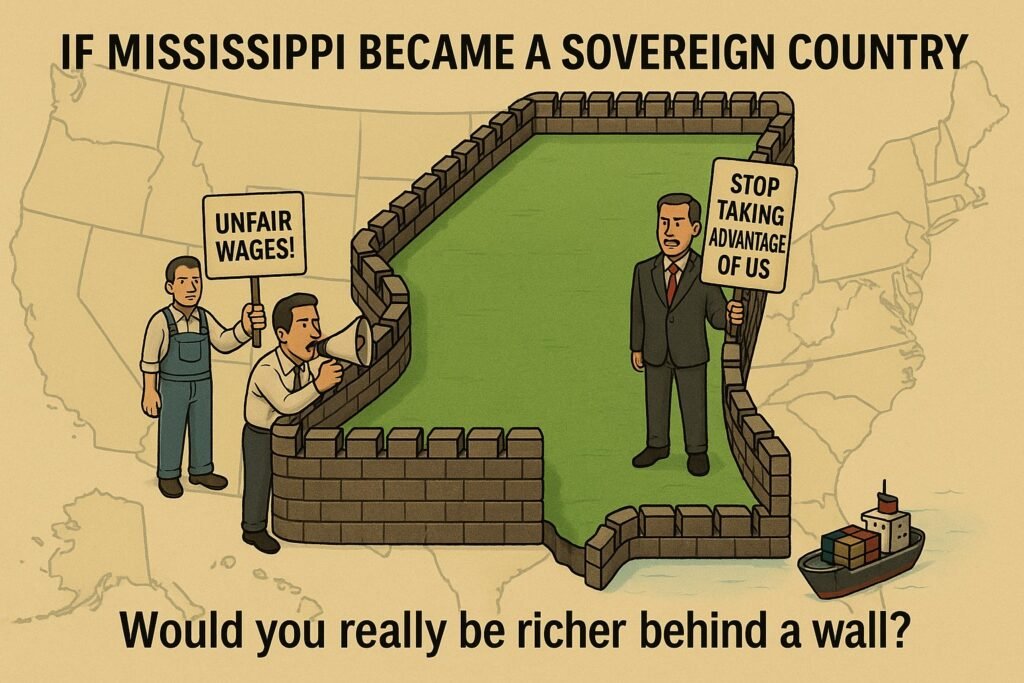Welcome to a little thought experiment. Suppose that Mississippi became a sovereign country. “Sovereign” means that the state apparatus can make any decision, even one that violates international law. The flip side of sovereignty is that the state can also impose its decision on the country’s residents or a portion of them, and that other states in the world have no recognized right to intervene against that imposition. States and their rulers were recognized as sovereign by the treaties of Westphalia in the mid-17th century.
Mississippi would be a poor country relative to the United States. The average hourly wage in Mississippi is $23.91, compared to $38.41 in California (Bureau of Labor Statistics, data for May 2024). On average, wages are thus 38% lower in Mississippi than in California. For the whole (current) USA, the average wage is $32.66, which means that Mississippian wages are on average (about) 27% lower than in the rest of the United States. As a newly sovereign country, Mississippi would be much poorer than the US, although still wealthier than, say, Vietnam or China.
Voices would be raised in the (remaining) United States to claim that American businesses cannot compete against their Mississippian counterparts given the latter’s “unfair” wage advantage. “We need fair trade, an equal playing field, with Mississippi,” American lobbyists and politicians would proclaim.
After the first national-account system in Mississippi is set up and its customs authorities have become effective enough at measuring trade flows, the new data would lead to further conflict. By virtue of a frontier having been drawn on the map, the trade deficit would suddenly become a politically contentious issue. It is likely that Mississippi currently has a trade deficit with the rest of the US, although it cannot be measured in the absence of border surveillance and control. After independence, many Mississippian lobbyists and politicians would get all pumped up about the trade deficit.
From a liberal-individualist viewpoint, nothing would have really changed: it would still be individual Mississippians and their private organizations trading with Americans and the latter’s private organizations. Many variables, including a few new ones, would adjust between the poorer traders in Mississippi and the richer traders in the US: the terms of trade and (if Mississippi had its own currency) currency exchange rates and the terms of trade; interest rates; foreign investment flows; public policy and government, etc.
It should be obvious that few individuals would become richer if the American state imposed tariffs on imports from Mississippi, or if the Mississippian state imposed tariffs on goods imported from the US. It would be the contrary: most people on both sides of the border would become poorer—and probably to a greater extent on the Mississippian side because of the relative size of the two economies. Nobody would become richer except for government favorites and cronies.
To make sure that most Mississippians would not get poorer whatever the government of the US does is if the government of the former adopted unilateral free trade, that is, let its own residents free to trade, to make whatever bargains they can with US residents (and residents of any other country). Mississippi could become a new Hong Kong. This would be true, mutatis mutandis, for the US: if its government did the same and stopped interfering with its residents’ trade, which is the definition of unilateral free trade, most Americans would gain. Temporary disruptions could of course happen, but nothing compared with what we are currently seeing in the US.
Collectivists of the left or the right have problems understanding this thought experiment, or else they are simply happy to exploit their fellow citizens (see my “Patriotism as Stealing from Each Other,” Regulation, Winter 2017-2018, pp. 64-69). It is a good measure of the perverse silliness of the current protectionist claims to compare them with the arguments that would be made on both sides of the new border: “unfair” Mississippian wages exciting American lobbyists, trade unionists, and politicians to clamor for the protection of manufacturing and agriculture; and Mississippian lobbyists and politicians calling for “protection” against high-tech and service imports from the US. Only a bit of imagination is necessary to think of Mississippian populist leaders arguing for protectionism because “the United States has been taking advantage of us and raping us for centuries” (a Trumpian sort of Mississippian populist would probably say “for millennia”).
******************************

Absurd protectionist battles after Mississippi became a sovereign country, by imperfect ChatGPT
